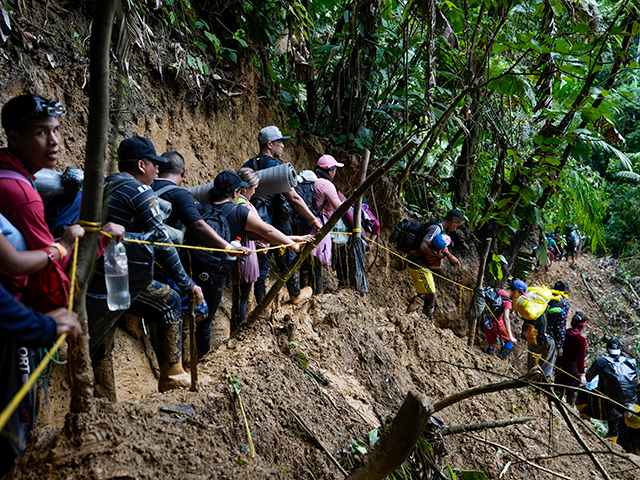In a bid to help curb migration the recently inaugurated government of Panama has begun installing barbed wire to block crossings used by U.S.-bound migrants passing through the dangerous Darién Gap jungle trail, NBC News reported on Monday,
Panamanian President José Raúl Mulino, who took office on July 1, vowed during his presidential campaign to crack down on U.S-bound migrants that pass through Panama by “closing down” the Darién Gap, a 30-mile-wide, 100-mile-long jungle trail that Panama shares with neighboring Colombia.
The Darién Gap is the only land bridge between South and Central America and has been used in recent years by hundreds of thousands of South American migrants to reach the United States.
Panama’s Migration Service documented the passage of 186,969 migrants through the Darién Gap between January and June 20 — less than two weeks before the start of Mulino’s administration on July 1.
“I will make an effort, that I have already started to talk about, to end the odyssey of the Darién, which has no reason to exist, and I reiterate that Panama and our Darién is not a transit route,” Mulino said in May during his official proclamation as president-elect.
According to a report published by NBC News on Monday, videos of the barbed wire fences installed in the Darién Gap began surfacing on messaging platforms as early as June 27. Public Security Minister Frank Abrego — who served as the first director of Panama’s Senafront National Border Service between 2008 and 2016 — reportedly confirmed in late June that “the patrol at the national border service has begun to block the majority of border passages.”
The Spanish news agency EFE reported on Wednesday that Senafront announced in a statement reviewed by the news agency that “measures were taken to control the massive irregular migration faced by the Panamanian State.”
These measures, according to the statement reviewed by EFE, are based on blocking “three unauthorized passes used by irregular migrants, which are identified as the passes along the Pacific coast and the Caribbean coast,” as well as “the land passes that give access to the sector of Hito de Chucurti; the latter was blocked with perimeter barriers that prevent the passage of migrants.”
Senafront explained that the goal is to “channel irregular migration” to Bajo Chiquito, a small town that in recent years has become the first stop of migrants crossing through the dangerous jungle trail.
Senafront reportedly stated:
With the previous control, security forces were available at multiple points, which dispersed efficiency in the fight against transnational criminal organizations that benefit from human trafficking, illegal charges and other crimes related to this vulnerable population.
“By concentrating efforts in a single step, the provision of territorial control patrols, protection and multidimensional security related to migrants is exponentially strengthened,” the Panamanian border service office continued.
NBC News reported on Monday that videos circulating on the WhatsApp messaging platform appear to show migrants “getting around” the barbed wire fencing. One of the videos, reportedly reviewed by NBC News, features a large crowd of men, women, and children that “can be seen lining up behind a fence as they take turns crawling into a hole dug under the barrier and into the jungle.”
The news agency also stated that “smugglers are also telling people that nothing has changed.”
“Listen to me, everything [routes] is active — Carreto, Acandi, Capurgana, Caledonia,” a smuggler reportedly said on Sunday in a WhatsApp chat group. “The guards did put a fence along Capurgana but people are passing one by one — kids, adults and they are passing the same. They have not sent anyone back nor are they sending anyone back.”
“Stop believing the news, they only seek to stop the flow of migrants,” another smuggler reportedly said through WhatsApp messaging last week. The smuggler claimed that the only people affected by the barriers are “negative” and “lazy” people.
Colombia, which shares part of the Darién Gap territory with Panama, denounced the blockage of the jungle trail’s transit routes in a statement issued by the Colombian Ombudsman’s Office on Friday, claiming that the closure of the Darién Gap routes “will affect the rights of the population in human movement.”
“Public servants from the Ombudsman’s Office, as part of their mission, visited the Astí village, one of the border points with Panama,” the statement reads. “There they saw how the installation of a barbed wire fence, approximately 80 meters long, prevents the passage on foot along the road leading to the rural territory of the Central American country.”
“The fence puts at risk the physical integrity of the migrants who daily try to cross,” the Colombian government argued, “because in one of its parts, where they threw pieces of wood for the wire to go down, in order to continue their way, their bodies are exposed to suffering lacerations with the barbed wire.”
The Colombian Ombudsman’s Office concluded by urging that Panama’s measures comply with “the principles, above all situations and announcements made, of a safe, orderly, regular migration and in conditions of human dignity.”
Christian K. Caruzo is a Venezuelan writer and documents life under socialism. You can follow him on Twitter here.

COMMENTS
Please let us know if you're having issues with commenting.